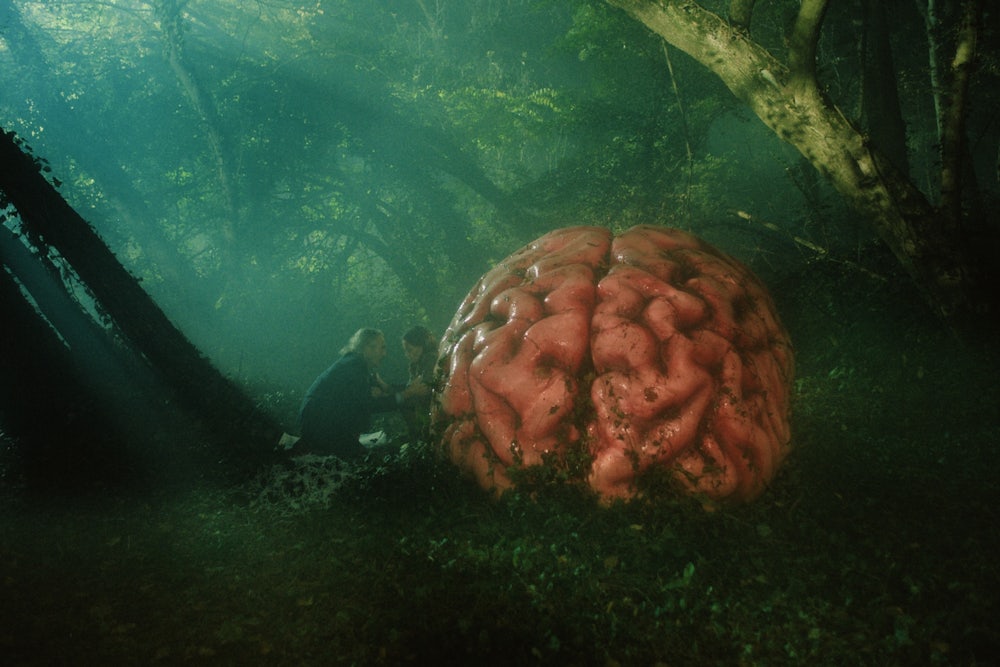Some footnotes to history are more mortifying than others. Recall if you will that, earlier this election year, the Academy Award–winning screenwriter Aaron Sorkin penned an op-ed in The New York Times hypothesizing that the best way to mend America’s battered fences (and to keep Donald Trump from finally building that wall) would be for liberals and conservatives to not only reach across the aisle but attempt a sort of collective group hug. Sorkin’s modest proposal—that the Democratic Party nominate a moderate (that is, an actual Republican) like Mitt Romney for the presidential slot—was goofy even by the standards of The West Wing, but it drew a bead on a pernicious species of liberal fantasy: that in the face of certain doom, our best chance for salvation lies in a rousing, perfectly delivered stump speech. Think Abraham Lincoln, or Atticus Finch in Sorkin’s recent Broadway revival of To Kill a Mockingbird. Or maybe The Manchurian Candidate, moments before a shot rings out at the presidential nominating convention.
One could argue that, at this point, this particular brand of grandstanding centrist rhetoric is beyond parody. Enter the Canadian trio of Guy Maddin, Evan Johnson, and Galen Johnson, who give it a good try via the wry new corridors-of-power comedy Rumours (note the Canadian spelling). The film, which premiered out of competition at the Cannes Film Festival, is set at a whimsically stylized version of the annual G-7 Summit, where the leaders of the world’s most prosperous and ostensibly progressive countries—including the filmmakers’ home and native land of Canada—renew interpersonal pleasantries and sip snifters of wine en route to drafting a “provisional statement” about some apparent new global crisis. Just as the Group of Seven is getting down to brass tacks, however, a mysterious breeze swings through their luxurious outdoor gazebo, disrupting their reverie and scattering pages of brainstormed solutions into the nearby woods—the answer, my friends, is blowing in the wind.
Between its isolated setting, discreetly charming characters, and ultra-bourgeois trappings, Rumours is clearly a movie made under the sign of Luis Buñuel, the Spanish master whose shadow falls over nearly a century’s worth of cinematic absurdism, including Maddin’s. The most distinctive filmmaker ever to emerge from the frozen tundra of Winnipeg, Manitoba, Maddin has been practicing his form of handmade, heart-on-sleeve surrealism since the mid-1980s. For the uninitiated, a good place to start would be 2000’s ecstatic, award-winning short The Heart of the World, which compresses an epic narrative about love, capitalism, and incipient apocalypse into six whipcrack minutes, or perhaps 2007’s autofictional My Winnipeg, a phantasmagorical exercise in personal and civic portraiture narrated by Maddin himself and canonized by no less than the Criterion Collection. If David Cronenberg is English-Canadian cinema’s reigning contemporary master, Maddin is something like its weirdo-intellectual jester, cheerfully spelunking through his own cluttered subconscious in a series of shorts, features, and gallery installations.
Before Rumours, Maddin’s highest-profile muse was probably Isabella Rossellini, who memorably adorned 2003’s black-and-white melodrama pastiche The Saddest Music in the World as a Depression-era beer baroness propped up by prosthetic legs filled with lager. For his latest, though, he’s recruited no less than Cate Blanchett, who’s also listed as an executive producer, and whose casting as a sleekly coiffed, impeccably accented German chancellor is something in between a stunt and a coup. After playing Lydia Tár, where could she go except straight to Angela Merkel?
It’s pretty evident early on that none of Rumours’ major characters are meant to be direct stand-ins for actually existing world leaders, although the tendency of Charles Dance’s U.S. president to nod off mid-anecdote could be perceived as a jab at Sleepy Joe Biden (his accent, meanwhile, is pretty far from Delaware—closer to Westeros). Instead, Maddin, Johnson, and Johnson are capering in the realm of nationalistic caricature, conceiving each of their protagonists as exaggerated embodiments of various social or cultural traditions: hence the portly French president (Denis Ménochet) with his untethered flights of poetic pretentiousness, or the revelation that the Italian premier (Rolando Ravello) likes cosplaying as Mussolini, and also keeps scraps of charcuterie in his breast pocket for round-the-clock snacking purposes.
The results vary in inspiration—there’s not a lot going on with either Nikki Amuka-Bird’s buttoned-up U.K. figurehead or Takehiro Hira’s Japanese P.M.—but when the strategy hits, it’s hilarious, as in the character of Maxime (Quebecois movie star Roy Dupuis), the craggily handsome, tragically man-bunned Canadian prime minister reeling from a combination of fraud scandals, serial philandering, and impostor syndrome, stemming from being the cohort’s junior member. Dupuis’s performance as a smoldering himbo bears traces of the recently embattled (and likely soon-to-be-ousted) P.M. Justin Trudeau—there’s a hollow gravitas that Dupuis skillfully strip-mines for humor and pathos, as Maxime and his world leader pals slowly and imperceptibly cross from simple inconvenience into Twilight Zone–style outrageousness. Not only have the leaders seemingly been abandoned by their entourages, but they’ve been cut off from the outside world entirely, and with it from any sense of authority. All that’s left over are the trappings of privilege, which prove useless: What happens if a wine glass goes empty in the forest and nobody is around to refill it?
The most explicitly Buñuelian aspect of Rumours is its grasping, dreamlike sense of futility. Like the partygoers in Buñuel’s masterpiece The Exterminating Angel, they can check out of their fancy summit anytime they like, but—for whatever reason—they can never leave. Their much-discussed group statement, meanwhile, functions as an existential MacGuffin, along the lines of the perpetually delayed gourmet meal in The Discreet Charm of the Bourgeoisie. The harder our (anti?)heroes work to craft a coherent response to the problem at hand (which also pointedly goes unspecified), the more they remain at odds and out to lunch.
They can perhaps be forgiven for their distraction in light of the other obstacles being strewn in their way by Maddin and company. These include a horde of recently exhumed, surpassingly slimy, and enthusiastically self-pleasuring bog people and a giant, disembodied, pulsating brain that looks like a prop from a 1950s sci-fi cheapie or maybe a vintage prog rock video; it appears at roughly the point where we start wondering if our heroes are just fools or have been lobotomized. Symbolism is a slippery slope, and at its core Rumours is less allegorical than it is surrealist: What makes it so enjoyable is the way that the characters take even the wackiest developments in stride. That’s why when Alicia Vikander shows up as a high-ranking Scandinavian government official in erotic thrall to the giant brain, the joke is that her delirious writhing is no big deal.
For all its expressive esoterica, Rumours may be Maddin’s most conventionally structured and produced feature to date. The narrative is fairly linear, especially once the characters devise a plan to get out of the woods and, hopefully, back to their constituents. The inherent strangeness of their plight is balanced by the relative restraint of the filmmaking, which is solid and accomplished without being particularly daring. There are no wild detours here: no turbocharged editing tricks or quasi-documentary interventions; no semisecret handshakes with Russian constructivism. Instead, it’s as if the directors were trying to channel—and, concurrently, critique—the glossy, anodyne tone of public-facing diplomacy by simplifying the film’s form and letting the charisma of the assembled A-listers carry the day.
This choice places more emphasis on the film’s political vision, which is about as far from Aaron Sorkin’s soaring rhetoric as you can get. The putative theme of the summit is “regret,” and as the global power brokers trade supposedly harrowing stories of various administrative failures and frustration, we’re cued to understand that they’re really just stroking their fragile egos. Signifiers of weaknesses abound: Maxime is an alcoholic who goes to pieces every time he reflects on his love life; after injuring his leg, the French president has to be carted around in a wheelbarrow. There’s fatigue (the U.S. president’s chronic narcolepsy) and gluttony (the ever-present charcuterie) and suggestibility: In the funniest set piece, the characters exchange increasingly fraught text messages with an unseen stranger who might be an imperiled child or a piece of advanced to-catch-a-predator AI software. By the time the group figures out that the fastest route home is via an archaic rope-assisted ferry barge, they could be adrift in a fractured fairy tale, or a vintage issue of Mad magazine.
As any political movie ultimately must, Rumours builds toward a sort of rhetorical reckoning. Its version of a rousing, hearts-and-minds-winning oratory is as sublimely ridiculous as everything else on display, though not particularly cutting. For a truly subversive bit of spoofery, you’d need to look at Maddin and Johnson and Johnson’s scabrous and brilliant 2015 short Bring Me the Head of Tim Horton, which used the conceit of a the-making-of documentary about the big-budget Canadian military drama Hyena Road to skewer both the archetypal tropes of combat movies and the vanity of its writer-director-star Paul Gross. It was a tricky little IED of a movie, designed ingeniously to blow up in its subjects’ faces. Rumours wants to be just as incendiary, quite literally in a closing montage that charbroils the notion of international coalition-building, but the impact of its provocation is arguably diffused by the production’s larger scale; it’s harder to style your movie as a Trojan horse when you’ve got one of the most acclaimed actresses in the world riding shotgun.
That Blanchett would show up—and give her all—for a movie as off-kilter as Rumours is at once admirable and unsurprising: This is, after all, the same devoted cinephile who did the Lord of the Rings series because she wanted to work with “the guy who made Brain Dead” and was paid little more than a set of elf ears for her performance. Her participation here ensures that Rumours will have more eyeballs on it than the rest of Maddin’s oeuvre put together—a fact that speaks as much to the market logic of movie stardom as to the film’s relative quality when compared to its predecessors. Maddin has surely gone further in the past, and sometimes to stranger places. But for anyone with a rooting interest in the fate of artists working stubbornly and exuberantly on their own terms, Rumours offers an object lesson in the art of deceptive compromise—one that any enterprising auteur (or aspiring head of state) would be wise to try to emulate.




